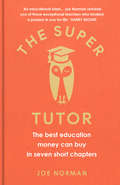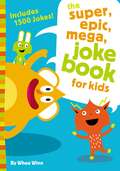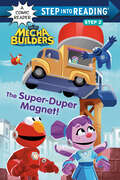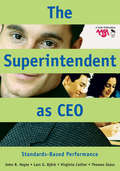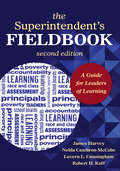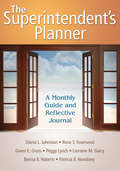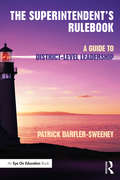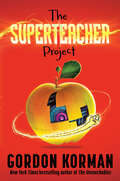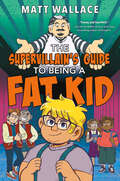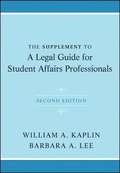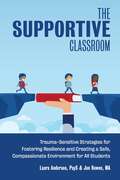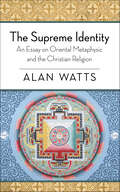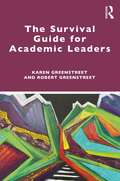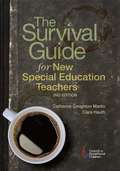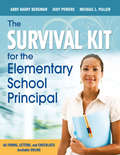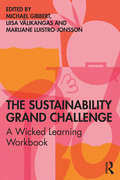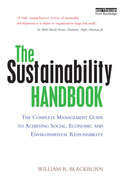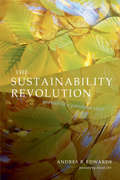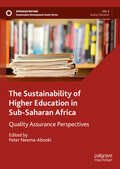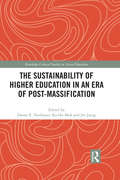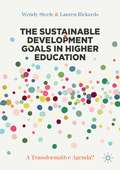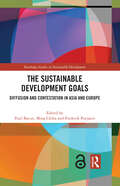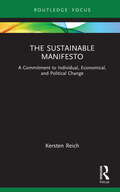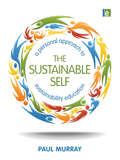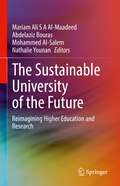- Table View
- List View
The Super Tutor: The best education money can buy in seven short chapters
by Joe NormanWhat do you remember from your school days?Analysing poems that didn?t make sense?The dreaded set texts?The Super Tutor celebrates the love of learning things for their own sake. Drawing on 15 years of tutoring, Joe Norman offers seven lessons that will stay with you for life ? how to tell a story, how to structure an argument, how to read a poem, how to think?Whether you are still a student or long finished with formal education, this book will build your confidence and remind you of the real purpose of learning: to fill your head with things that are useful, or beautiful, or hopefully both.
The Super, Epic, Mega Joke Book for Kids
by Whee WinnThe Mega Joke Book is just the thing for comedians and joke-lovers, young and old! Kid-friendly and fun, this collection of hundreds of jokes, riddles, tongue twisters, and more will keep everyone giggling for hours.So, what’s the funniest joke you’ll find in this book?Knock, knock. Who’s there? Lena. Lena who? Lena little closer and I’ll tell you!
The Super-Duper Magnet! (Step into Reading)
by Lauren ClaussMecha Elmo, Mecha Abby, and Mecha Cookie Monster have a very attractive problem to solve!When a super-duper magnet at a construction site accidentally turns on, attracting all the metal in the city, the Mechas are ready to help. But the robot friends are made of metal, too! The mighty Mecha Builders try different plans and they don't give up until the problem is solved. This Step 2 Step Into Reading Comic Reader features word balloons and eye-catching graphic panels. Based on an episode of Mecha Builders, from the creators of Sesame Street.
The Superintendent as CEO: Standards-Based Performance
by John R. Hoyle Lars G. Bjork Dr Virginia Collier Thomas Eugene GlassThe first of its kind, this unique text identifies the knowledge needed by current and aspiring school district CEOs to become high performers.
The Superintendent's Fieldbook: A Guide for Leaders of Learning
by Nelda H. Cambron-McCabe Harvey S. James Jr. Luvern L. Cunningham Professor Robert H. KoffGuidance for ever-changing challenges, success through improved effectiveness Equip yourself to face the demands of a superintendent with this practical guide for new and veteran district leaders. Understanding leadership and budgets is only one piece of a pie that has grown to include privatization, performance-based teacher compensation, technology, and global comparisons like PISA. Based on research with 300 superintendents, this new edition is your touchstone for practical advice on how to: Survive on the job Bargain like a pro Work with your school board Tackle the achievement gap Explain to the public what's right with American schools
The Superintendent's Planner: A Monthly Guide and Reflective Journal
by Gloria L. Johnston Rene S. Townsend Gwen E. Gross Margaret A. Lynch Lorraine M. Garcy Benita B. Roberts Patricia B. NovotneyThis reflective calendar and planning journal helps new and veteran superintendents address day-to-day concerns while keeping student achievement in perspective throughout the year.
The Superintendent’s Rulebook: A Guide to District-Level Leadership
by Patrick Darfler-SweeneyA concise and accessible text, The Superintendent’s Rulebook explores the human-resource, political, and leadership dimensions of the superintendency. This important book is designed for new aspiring superintendents and Boards of Education, helping readers to apply the many leadership lessons taught in training programs and education leadership courses to their everyday practice. Full of real-world examples, takeaway strategies, and supplemented with discussion and "inbox" questions, this valuable resource encourages reflection, while capturing the day-to-day spirit and complexities of district-level leadership.
The Superteacher Project
by Gordon KormanFrom Gordon Korman, the bestselling author of Restart and The Unteachables, comes a hilarious new story about a mysterious new teacher who turns out to be an AI robot from a secret experimental program.Oliver Zahn, spitball champion and self-declared rule-wrecker of Brightling Middle School, is not a fan of his new homeroom teacher, Mr. Aidact. The guy is sort of stiff, never cracks a smile, and refers to them as “pupils.” The worst part is he catches Oliver before he can pull any of his signature pranks! It’s time for Oliver and his best friend, Nathan, to show the new teacher who’s boss.But as the weeks go by, they start to realize that Mr. Aidact is not what they expected. He has an uncanny ability to remember song lyrics or trivia. When the girls’ field hockey team needs a new coach, he suddenly turns out to be an expert. He never complains when other teachers unload work on him—even when it’s lunchroom duty and overseeing detention. Against all odds, Mr. Aidact starts to become the most popular teacher at Brightling.Still, Oliver and Nathan know that something is fishy. They’re determined to get to the bottom of the mystery: What’s the deal with Mr. Aidact?
The Supervillain's Guide to Being a Fat Kid
by Matt WallaceMatt Wallace, author of Bump, presents a personal, humorous, and body-positive middle grade standalone about a fat kid who wants to stop his bullies . . . and enlists the help of the world’s most infamous supervillain. Perfect for fans of Holly Goldberg Sloan, Julie Murphy, and John David Anderson!Max’s first year of middle school hasn’t been easy. Eighth-grade hotshot Johnny Pro torments Max constantly, for no other reason than Max is fat and an easy target. Max wishes he could fight back, but he doesn’t want to hurt Johnny . . . just make him feel the way Max feels.In desperation, Max writes to the only person he thinks will understand: imprisoned supervillain Master Plan, a “gentleman of size.” To his surprise, Master Plan wants to help! He suggests a way for Max to get even with Johnny Pro, and change how the other kids at school see them both.And it works! When Master Plan’s help pays off for Max in ways he couldn’t have imagined, he starts gaining confidence—enough to finally talk to Marina, the girl he likes in class who shares his passion for baking. With Master Plan in his corner, anything seems possible . . . but is there a price to pay for the supervillain’s help?* A Junior Library Guild selection *
The Supplement to A Legal Guide for Student Affairs Professionals
by Barbara A. Lee William A. KaplinBased on the latest rulings, court cases, and legal actions that bear on the conduct of higher education, this student affairs supplement provides updated information regarding current rulings and recent cases for student affairs practitioners and graduate students in student affairs administration courses.Designed specifically for practitioners, this suppliment is the most updated and easy-to-use volume for student affairs officers and students.Topics include the latest updates on:Higher Education Opportunity Actlitigation involving online courses or programsnew cases involving students with disabilitiesnew federal rules about federal student loan programsnew developments in student disciplinestudent suicidesearching residence hallscampus security issues
The Supportive Classroom: Trauma-Sensitive Strategies for Fostering Resilience and Creating a Safe, Compassionate Environment for All Students (Books For Teachers Ser.)
by Laura Anderson Jon BowenBuild a mindful, trauma-aware classroom today with this practical, easy-to-use book. Designed specifically for busy teachers, it is full of strategies and tools for understanding trauma and building empathy.One in four children have witnessed or experienced a traumatic event that can affect behavior and learning. But school can be a safe, stress-free environment that can actually reduce bad behavior, foster resilience, and heal trauma. The Supportive Classroom shows teachers and educators how they can provide the different types of trauma-aware support that each student needs. Written by two experienced school psychologists, The Supportive Classroom offers an easy-to-understand overview of trauma, empathy, and self-care paired with proactive and reactive tools that can be implemented in the classroom right away. These practical ideas include: - Suggestions for classroom setup - Proactive behavioral supports - Checklists for identifying triggers - Examples of trauma-aware support from real-life students and teachers - Strategies for recognizing trauma exposure Every teacher brings their own unique culture, style, and passion into the classroom. This book offers a blueprint for creating a safe, welcoming classroom based in trauma-sensitive practice that can be adapted to your unique classroom.
The Supreme Identity: An Essay on Oriental Metaphysic and the Christian Religion
by Alan WattsModern Civilization, Watts maintains, is in a state of chaos because its spiritual leadership has lost effective knowledge of man's true nature. Neither philosophy nor religion today gives us the consciousness that at the deepest center of our being exists an eternal reality, which in the West is called God. Yet only from this realization come the serenity and spiritual power necessary for a stable and creative society. One of the most influential of Alan Watts's early works, The Supreme Identity examines the reality of civilization's deteriorated spiritual state and offers solutions through a rigorous theological discussion on Eastern metaphysic and the Christian religion. By examining the minute details of theological issues, Watts challenges readers to reassess the essences of religions that before seemed so familiar and to perceive Vedantic "oneness" as a meeting ground of all things – "good" and "evil." In addressing how religious institutions fail to provide the wisdom or power necessary to cope with the modern condition, Watts confidently seeks the truth of the human existence and the divine continuum. In this eye-opening account of "metaphysical blindness" in the West, Watts accents this dense exploration of religious philosophy with wry wit that will engage inquiring minds in search of spiritual power and wisdom.
The Survival Guide for Academic Leaders
by Robert Greenstreet Karen GreenstreetProviding essential guidance on how to survive and develop as an academic leader to achieve results and avoid common pitfalls, this highly practical and accessible book communicates the importance of learning to build trust and meaningful relationships as a central component to achieving in this role. To ensure leaders are on the right track to success, this guide offers insights from the STARBUILDING© professional coaching diagnostic developed by Karen Greenstreet, a long-term vision model that identifies the key constituencies an academic leader must serve (clients, colleagues and self), and the skillsets they must master (communication, organization and thinking). Demonstrating that simplicity is essential, practical advice is structured in an easy-to-follow approach with sources and checklists included. Beyond the easily navigable framework, this innovative book addresses crucial issues, such as staff development, public service, fundraising, and career success. Newly appointed and aspiring educational leaders and administrators, as well as consultants and government agency managers, will equally appreciate this practical toolbox of leadership techniques, helping them to build leadership judgement and political savvy from their first day on the job.
The Survival Guide for New Special Education Teachers
by Catherine Creighton Martin Clara HauthThe second edition of The Survival Guide for New Special Education Teachers is a must-have handbook for all new teachers both those in special education and those teaching in general education inclusive classrooms. The best part is the personal commentary and opportunities for reflection strategically placed throughout the guide. They make you feel like you have a mentor there to help you every step of the way.
The Survival Kit for the Elementary School Principal
by Abby B. Bergman Judith E. Powers Michael L. PullenPacked with essential forms, letters, charts, and checklists, this easy-to-use kit offers solutions for virtually any leadership or administrative challenge that elementary school principals commonly face.
The Sustainability Grand Challenge: A Wicked Learning Workbook
by Edited by Michael Gibbert, Liisa Välikangas and Marijane Luistro-JonssonHow do universities tackle wicked sustainability challenges faced by society? The Wicked Learning Workbook is a toolkit for setting up and running an interdisciplinary master-level course in the context of real-world problems such as food waste and loss. The book offers a new pedagogical approach that we call 'wicked' because it is unorthodox, ambitious, and tackles complex problems that won’t go away. The pedagogy is also international at the course level rather than the conventional exchange semester, enabling institutions to embed international approaches to their core teaching. The Wicked Learning Workbook speaks directly to academics who are looking for solutions that provide stimuli for research and teaching while giving students an innovative, international learning experience. The approach develops student understanding of the UN Sustainable Development Goals as broad-scale societal issues which are difficult, if not impossible, to ‘solve’. An important outcome of this approach is the laboratory-style classroom that creates opportunities for faculty, students and companies to co-create solutions that are immediately implementable. The resulting methodology is based on industry–university collaboration (such as IKEA and Nestlé). The methodology is of interest to corporate leaders pursuing sustainability goals and business transformation. Achieving sustainability requires cross-boundary, cross-disciplinary, experimental approaches that allow for scalability. Wicked problems can only be tackled with wicked solution approaches.
The Sustainability Handbook: The Complete Management Guide to Achieving Social, Economic and Environmental Responsibility
by William R. BlackburnThe Sustainability Handbook covers all the challenges, complexities and benefits of sustainability for businesses, governments and other organizations. It provides a blueprint for how organizations can reach or exceed economic, social and environmental excellence. It offers a host of practical approaches and tools including a model sustainability policy for organizations, summaries of sustainability codes and tips on selecting them, an extensive collection of metrics and a wealth of supplementary reference material. This is the essential reference for every organization in pursuit of sustainability.
The Sustainability Revolution: Portrait of a Paradigm Shift
by Andres R. Edwards David W. OrrSustainability has become a buzzword in the last decade, but its full meaning is complex, emerging from a range of different sectors. <P><P>In practice, it has become the springboard for millions of individuals throughout the world who are forging the fastest and most profound social transformation of our time--the sustainability revolution. The Sustainability Revolution paints a picture of this largely unrecognized phenomenon from the point of view of five major sectors of society: Community (government and international institutions)Commerce (business)Resource extraction (forestry, farming, fisheries etc.)Ecological design (architecture, technology)Biosphere (conservation, biodiversity etc.) The book analyzes sustainability as defined by each of these sectors in terms of the principles, declarations and intentions that have emerged from conferences and publications, and which serve as guidelines for policy decisions and future activities. Common themes are then explored, including: An emphasis on stewardshipThe need for economic restructuring promoting no waste and equitable distributionAn understanding and respect for the principles of natureThe restoration of life formsAn intergenerational perspective on solutions Concluding that these themes in turn represent a new set of values that define this paradigm shift, The Sustainability Revolution describes innovative sustainable projects and policies in Colombia, Brazil, India and the Netherlands and examines future trends. Complete with a useful resources list, this is the first book of its kind and will appeal to business and government policymakers, academics and all interested in sustainability.
The Sustainability of Higher Education in Sub-Saharan Africa: Quality Assurance Perspectives (Sustainable Development Goals Series)
by Peter Neema-AbookiThis book delves into the role of higher education as a means of sustainable development in Sub-Saharan Africa. Contributions from across the region examine the strategies and technological advances available to enable students to deal with an uncertain future and are organised under two key themes: Curriculum and Teaching and Higher Education and Innovations. The volume brings together theoretical and practical perspectives, relating them to international benchmarks while maintaining the specificities of the African context. It will be of interest to students and scholars as well as practitioners whose work interrogates higher education, quality assurance, and sustainable development goals.
The Sustainability of Higher Education in an Era of Post-Massification (Routledge Critical Studies in Asian Education)
by Deane Neubauer Jin Jiang Ka MokThis volume examines the sustainability of higher education massification throughout the Asia Pacific region. The massification of higher education has swept across the region over the past three decades in complex and astounding ways in some cases. The book inquires after the many faces that higher education massification is taking in varied country settings and seeks to identify the more important implications that follow. It discusses massification and its sustainability within the region’s complex contexts and addresses the issues of implications, challenges, and limitations. Paying particular attention to implications on resources, employment and social mobility, institutional identity, programs, funding and teacher education, the book explores the capacity of countries to stay on the course they have chosen and the implications this may have for the continued identification of resources to do so, the choice to focus more particularly and importantly on the considerable range of innovations and variations and the ability to recognize and develop them in meaningful ways.
The Sustainable Development Goals in Higher Education: A Transformative Agenda?
by Wendy Steele Lauren RickardsThis book explores the role universities have to play in fulfilling the Sustainable Development Goals (SDGs). At the heart of “sustainable development” is the legacy of unsustainable development with its roots in modernity and colonialism. Critical engagement with the SDGs involves recognising these roots are shared by universities and the reciprocal need for maintenance, repair and regeneration. Universities are not just enablers of change, but also important targets of change. By focusing on the role of education about, for and through the SDGs, the authors seek to advance critical engagement with higher education that is both progressive and meaningful. We are all responsible for bearing witness to our age. This book will appeal to all those who hope that more sustainable future worlds are still possible.
The Sustainable Development Goals: Diffusion and Contestation in Asia and Europe (Routledge Studies in Sustainable Development)
by Paul Bacon Frederik Ponjaert Mina ChibaThere have been significant efforts to implement the Sustainable Development Goals (SDGs) at multiple levels of governance across all regions of the world. However, the manner in which the global governance norms underlying the SDGs are actually being diffused is under-researched and not well understood. This book considers the promotion of the SDGs through the lens of norm diffusion theory, with a focus on three SDG policy areas; health, education and decent work. A distinctive feature of the book is that it offers multiple original case studies of SDG norm diffusion involving Asian and European actors. A unique feature is that the case studies in the book identify relevant SDG norm senders and norm receivers, and examine the relationship between them. The book also challenges the assumption that the SDGs themselves are static and unchanging, and reveals how SDG norms are dynamic and can be reformulated as a result of contestation between norm senders and norm receivers. As well as introducing a diverse and original set of case studies, the book therefore allows readers to deepen their understandings of the policy diffusion mechanisms by which SDGs are diffused, and grasp the patterns of success and failure in the implementation of these policies.
The Sustainable Manifesto: A Commitment to Individual, Economical, and Political Change (Routledge Focus on Environment and Sustainability)
by Kersten ReichIn The Sustainable Manifesto, Kersten Reich describes in a concise and memorable way the necessary actions that humans need to take to live sustainably and combat climate change. Are we sufficiently capable of changing our behaviour towards sustainability? What do we have to do in a more sustainable way, and how? The Sustainable Manifesto considers questions around behaviour-change and action for sustainability and connects this thinking to current research in both the natural and human sciences. Reich begins by addressing the most important risks to sustainability and looks in particular at climate change, biodiversity, land use and global phosphorus and nitrogen cycles. He goes on to identify the main causes that have led to the current crisis: specifically the human desire for expansion, growth in all areas, progress and competitive advantages that have forced consideration of the common good into the background. In this vein, the author highlights how economics and politics are two driving forces for which sustainability is difficult to comprehend, going against their basic principles of a liberal and now neo-liberal expansion of all markets. Finally, Reich demonstrates how sustainability could be possible if we reprioritize our life goals and face the reality of an ecological crisis and the necessary transformation of society in order to save our planet. Innovative and accessible, this book will be of interest to students and researchers of sustainability, theories of learning, human behaviour, as well as those who are looking for answers on how to fight for a sustainable future.
The Sustainable Self: A Personal Approach to Sustainability Education
by Paul MurrayAchieving a sustainable society is the biggest issue of our time. It is not an issue confined to a particular subject area or to certain jobs. It is a way of thinking and behaving that will need to be embedded in all aspects of all of our lives. The Sustainable Self is the perfect resource for lecturers, trainers, students and professionals of any discipline who need to teach or learn about sustainability. There is widespread agreement that we need to live more sustainable lives. But when up against entrenched habits and everyday obstacles, it can be difficult to turn good intentions into action. This book presents a complete ?curriculum? for effecting a personal transformation towards sustainability, showing you how to align your personal and professional actions with your values and beliefs. Full of activities that can be done individually or in groups, it is supported by additional resources online including downloadable worksheets and directories of sustainability organisations. Recommended readings at the end of each chapter enable readers to pursue areas of personal or professional interest.
The Sustainable University of the Future: Reimagining Higher Education and Research
by Abdelaziz Bouras Mariam Ali S A Al-Maadeed Mohammed Al-Salem Nathalie YounanThe Sustainable University of the Future discusses the rapid changes taking place within institutions of higher education—changes that have pushed universities to reconsider their traditional policies and plans. The book, which has its origins in the Qatar University Annual Research Forum and Exhibition (QUARFE) event “University of the Future” examines the many ways universities are trying to keep pace with this transformation, despite regional and international challenges. The book looks at the role of universities in meeting the United Nation's Sustainable Development Goals (SDGs), the impact of Industry 4.0, the social aspects of University 4.0, and the future of research-based universities. The need to adopt modern programs and tools is stressed, and ways to anticipate and plan for future challenges are explored.
